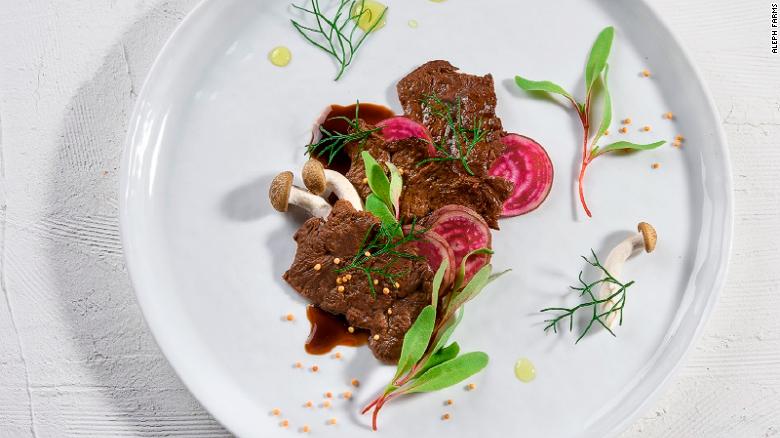While many flock to Israel for falafel and shakshuka, it is less famous for its food technology.
Yet the country — home to more than 350 agriculture and food technology companies — punches above its weight. In 2018, annual investment in Israel's food tech sector rose to $100 million, according to a recent report by Start-Up Nation Central.
This makes it a strong player within a booming market: BIS Research predicts the global food tech market to be worth more than $250 billion by 2022.
"So much is happening in such a small place," says Tamar Weiss, development manager for the agri-food tech sector of Start-Up Nation Central.
Weiss believes this is down to Israel's ambition to tackle the environmental and ethical challenges around agriculture. "People are aware of it in their own personal life, this has really pushed the sector forward," she adds.
Sustainable food
In 2017, Didier Toubia set up Aleph Farms, an Israeli food company that engineers cultured beef — meat grown in a laboratory from cow cells.
"The objective was to bring balance back to nature, and to use the natural resources on earth in a wiser way," he tells CNN Business.
The company has raised $14 million to date and made headlines around the world last year for developing the first slaughter-free beef steak. In October, it successfully grew meat in space for the first time.
This experiment proved that cultivated meat could be a way of producing high quality protein using less resources, says Toubia.
Barclays predicts the alternative meat sector could reach about $140 billion in sales over the next decade, with companies like Impossible Burger and Beyond Meat leading the charge.
Though not yet commercially available, the cultured meat market is also expanding, with the number of startups in the field increasing from four at the end of 2016 to more than two dozen last year, according to The Good Food Institute.
Israel's thriving scene is in part thanks to its government's Innovation Authority, which provides company grants and has financed a $28 million food tech incubator.
But it is also about the culture. "In Israel, there is a lot of awareness of animal welfare ... I think it is encoded into the Jewish tradition," says Toubia.
Weiss adds to this stating that the kosher culture "brings in a lot of awareness around food: it being clean, or made in a specific way, or linking values with food."
Animal welfare
Yehuda Elram, CEO of Jerusalem-based start-up eggXYt agrees that the Jewish religion values compassion towards animals. "These are conscientious consumers who demand that companies abide by certain rules, among them is ending animal cruelty," he says.
eggXYt has developed a technology that can detect the gender of chicks before hatching, in order to prevent the practice of male chick culling in poultry farming where female chicks are required for egg production.
Each year, roughly seven billion male chicks are killed after hatching, according to industry estimates.
Sorting males from females before the chicks hatch would avoid this, while also helping financially: factories would no longer waste space and energy incubating male eggs, and the eggs could be repurposed for the food or cosmetics industry.
eggXYt is one of a number of startups working on this issue, but is unique in its non-invasive, pre-incubation method. Using CRISPR, a gene editing tool, they insert a detectable biomarker into the laying chicken's DNA which marks the gender of the eggs without any side effects. The laid eggs are then sent through a scanner that identifies the male eggs because of their light fluorescent glow.
"Its accuracy rate is very high and it has no effect on the hatchability of the female eggs. And it leaves the industry with the seven billion male unincubated eggs as a product rather than waste," says Elram.
While eggXYt would not disclose its value, the company was granted $4 million in grants from the Israeli Innovation Authority, EU Horizon 2020 and other awards, says Elram. Its technology is currently undergoing regulatory approval.
Personal health
Another major trend dominating Israel's food tech arena is health, with firms like Amai Proteins and DouxMatok developing sugar alternatives.
Or MyFavorEats, a Tel Aviv-based startup, which has developed an algorithm that customizes online recipes, suggesting alternatives when ingredients are unavailable or tailoring it to a user's dietary requirements.
"For example, a diabetic, who needs to keep a certain amount of carbohydrates per dish, or a professional sports person, who is counting proteins," says Orly Rapaport, the company's CEO.
The algorithm, trained on 1 million recipes, has learned to recognize the role of each ingredient and its taste and texture parameters. Though not yet on the market, the technology will be available through wellness and health apps or recipe publishers.
Not only does this cater to the growing trend of veganism and vegetarianism, but also to the rising prevalence of food allergies. The World Allergy Organization estimates that between 240 and 550 million people suffer from food allergies worldwide.
SOURCE: CNN





